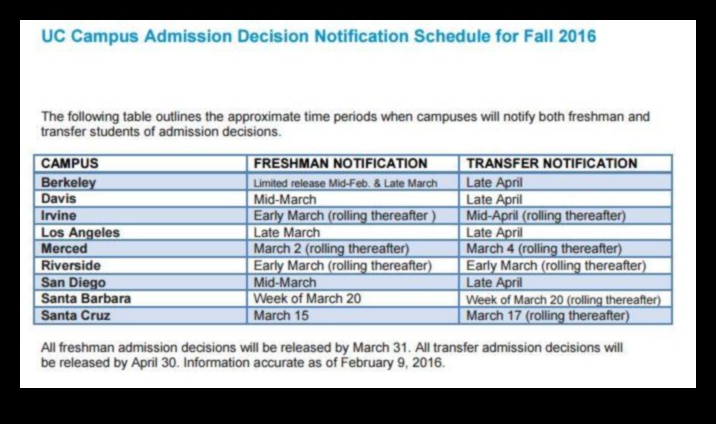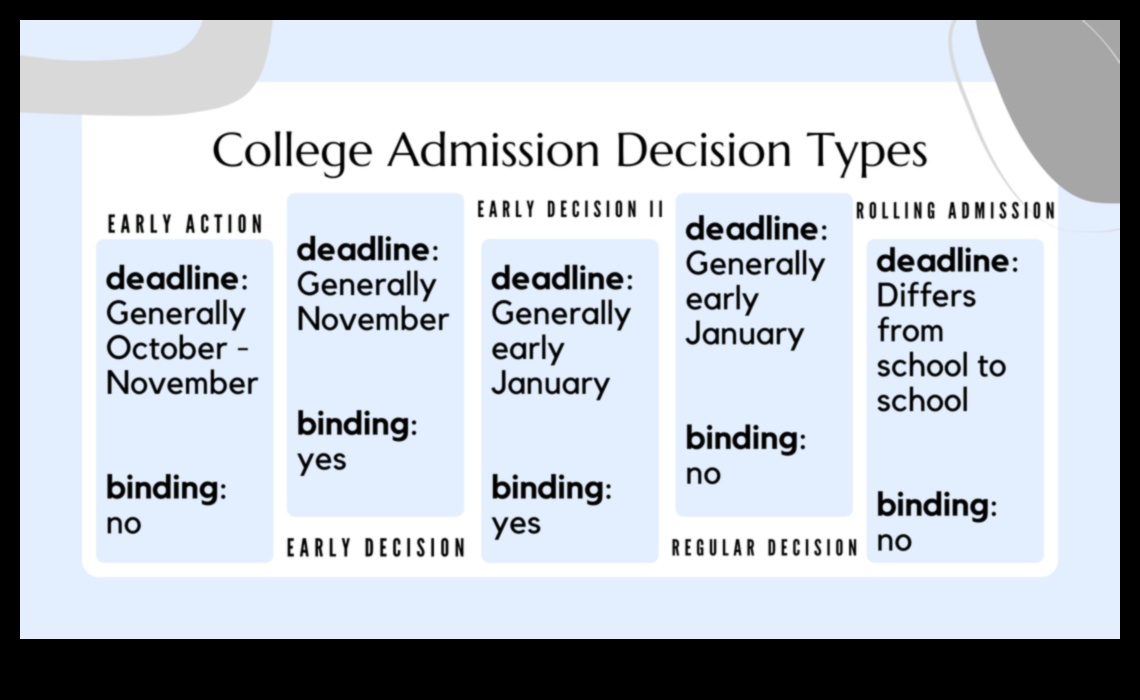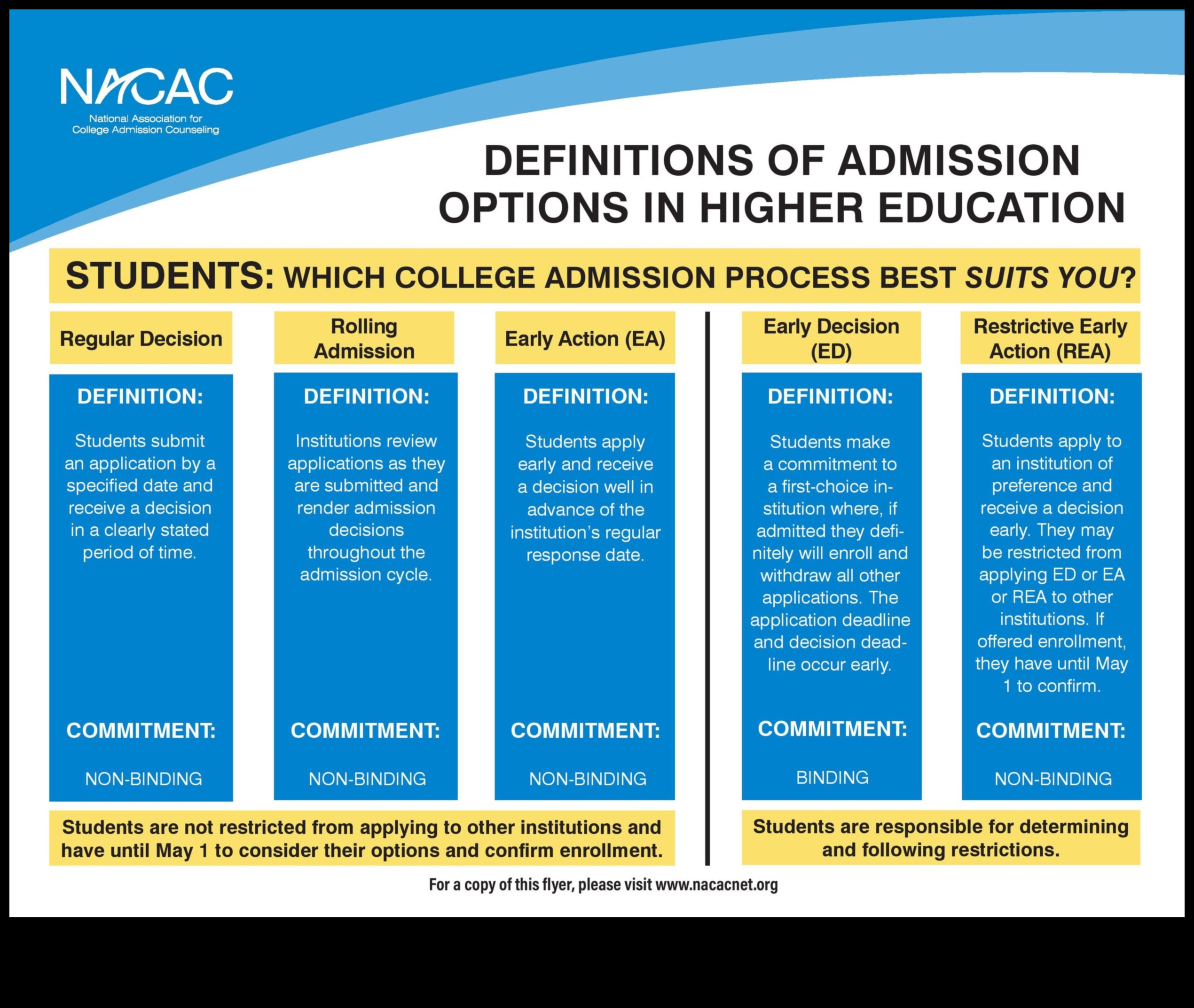
College Admissions Release Dates
II. When Do Colleges Release Decisions?
III. How to Prepare for College Admissions Release Dates
IV. What to Do if You Don’t Get into Your Dream College
V. What to Do if You Get into Multiple Colleges
VI. How to Decide Which College to Attend
VII. Financial Aid Deadlines for College Admissions
VIII. Tips for Applying to College Early Decision
IX. Tips for Applying to College Regular Decision
X. FAQs About College Admissions Release Dates
| Feature | Answer |
|---|---|
| College Admissions Timeline |
|
| College Admissions Decisions |
|
| College Acceptance Rate |
|
| Early Decision Admissions |
|
| Deferred Admissions |
|

II. When Do Colleges Release Decisions?
The majority of colleges and universities release their admissions decisions in the spring, typically between March and May. However, some colleges release decisions earlier, in December or January, while others may wait until the summer. The exact date that a college releases its decisions will vary depending on the school, so it’s important to check the school’s website for specific information.
In general, colleges release decisions in the following order:
- Early decision
- Early action
- Regular decision
Early decision and early action applicants are typically notified of their decisions in December or January, while regular decision applicants are notified in March or May. However, some colleges may release decisions for all applicants at the same time, regardless of their application type.
It’s important to note that the date that a college releases its decisions does not necessarily indicate the quality of your application. Some colleges release decisions early to give students more time to make a decision about whether to attend, while others may wait until the summer to allow students to receive all of their acceptances before making a decision.
III. How to Prepare for College Admissions Release Dates
The college admissions process can be stressful, but there are a few things you can do to prepare for the release of your decisions.
First, make sure you have a plan for how you will find out your decision. Most colleges will release decisions through their online portals, but some may also mail or email decisions. Make sure you know how you will receive your decision and check your designated method regularly.
Second, take some time to think about what you will do if you get into your dream school, if you get into multiple schools, or if you don’t get into any of your schools. Having a plan in place will help you to feel more prepared and in control of the situation.
Finally, try to relax and enjoy the moment. The release of college admissions decisions is a big milestone, but it is also just one step in the process of choosing a college. Take some time to celebrate your accomplishments and then focus on the next steps.

II. When Do Colleges Release Decisions?
The exact date that colleges release decisions varies from school to school. However, most colleges release decisions in the spring, typically between March and May. Some colleges may release decisions earlier or later than this, so it is important to check the admissions website of each college you are applying to for specific information.

V. How to Decide Which College to Attend
Once you have been accepted to multiple colleges, it can be difficult to decide which one to attend. There are many factors to consider, including the cost of attendance, the location of the college, the academic programs offered, and the campus culture.
Here are some tips for making a decision about which college to attend:
- Consider your financial situation. Make sure that you can afford to attend the college of your choice without taking on too much debt.
- Think about where you want to live. Do you want to be close to home or in a new city?
- Research the academic programs offered by each college. Make sure that the college has the programs that you are interested in.
- Visit the campuses of the colleges that you are considering. This will give you a chance to see the campus, meet with students and faculty, and get a feel for the campus culture.
Making a decision about which college to attend is a big decision. Take your time and weigh all of your options carefully. The college that you choose will be an important part of your life for the next four years, so make sure that it is the right fit for you.

VI. How to Decide Which College to Attend
Deciding which college to attend is a big decision. There are many factors to consider, including the cost of tuition, the location of the college, the academic programs offered, and the campus culture.
Here are some tips for making a decision about which college to attend:
- Visit each college campus and get a feel for the atmosphere.
- Meet with professors and students to learn more about the academic programs offered.
- Talk to the financial aid office about how much you can expect to pay for tuition and fees.
- Consider the location of the college and how it will fit into your lifestyle.
- Make a list of the pros and cons of each college and choose the one that is the best fit for you.
Making a decision about which college to attend is a big decision, but it is one that you will make for the rest of your life. Take your time, weigh the pros and cons, and choose the college that is the best fit for you.
VII. Financial Aid Deadlines for College Admissions
The financial aid deadlines for college admissions vary depending on the college or university. However, most colleges and universities have a general financial aid deadline of February 15th. This means that students who are applying for financial aid must submit their financial aid applications by this date in order to be considered for financial aid.
It is important to note that some colleges and universities have earlier financial aid deadlines, so it is important to check the financial aid deadlines for each college or university that you are applying to.
If you are unable to submit your financial aid application by the deadline, you may still be able to apply for financial aid, but you may not be considered for all types of financial aid.
For more information on financial aid deadlines, please visit the financial aid website of the college or university that you are applying to.
Tips for Applying to College Early Decision
Early decision is a binding admissions process that allows you to apply to a college before the regular admissions deadline. If you are accepted to a college early decision, you are obligated to attend that college. Early decision can be a great option for students who are confident in their academic and extracurricular achievements and who are committed to a particular college. However, it is important to carefully consider all of your options before making a decision about early decision.
Here are some tips for applying to college early decision:
- Do your research and make sure that you are truly interested in the college to which you are applying early decision.
- Visit the college and meet with admissions representatives to learn more about the school.
- Write a strong personal statement that demonstrates your interest in the college and why you would be a good fit.
- Submit your application early to give yourself the best chance of being accepted.
If you are accepted to a college early decision, congratulations! You have made a great decision and are one step closer to achieving your college dreams.
Regular decision is the standard admissions process for most colleges and universities. In this process, students apply to colleges by a certain deadline in the fall, and then colleges make their admissions decisions in the spring.
There are a few things you can do to improve your chances of getting into a college on regular decision.
- Start early. The earlier you start your college application process, the more time you’ll have to research colleges, write your essays, and get your recommendations in.
- Do your research. Each college has its own unique admissions criteria, so it’s important to do your research and make sure you’re applying to colleges that are a good fit for you.
- Write strong essays. Your essays are your chance to show colleges who you are and why you’re a good fit for their school. Take your time writing your essays and make sure they’re well-written and error-free.
- Get good grades. Colleges want to see that you’re a hard worker and that you’re capable of succeeding in college. Keep your grades up and try to challenge yourself in your classes.
- Get good test scores. Colleges use standardized test scores as one way to measure your academic ability. Make sure you take the SAT or ACT and study hard for it so you can get a good score.
- Get involved in extracurricular activities. Colleges want to see that you’re a well-rounded student who is involved in your community. Get involved in extracurricular activities that you’re passionate about and that you can talk about in your college applications.
- Get good letters of recommendation. Letters of recommendation can be a valuable asset to your college application. Ask teachers, coaches, or other mentors who know you well to write letters of recommendation for you.
By following these tips, you can improve your chances of getting into a college on regular decision.
FAQs About College Admissions Release Dates
Q: When do colleges release decisions?
A: The vast majority of colleges release decisions on a rolling basis, meaning that they start sending out acceptance letters in December and continue to do so throughout the spring. However, some colleges do have set release dates for all decisions, and these dates are typically published on the college’s admissions website.
Q: How can I prepare for college admissions release dates?
A: There are a few things you can do to prepare for college admissions release dates. First, make sure you have a good understanding of your college options and the deadlines for each school. Second, create a plan for how you will react to each possible outcome, whether you get into your dream school, get into multiple schools, or don’t get into any of your schools. Finally, stay calm and focused on the things you can control, such as your grades and your essays.
Q: What do I do if I don’t get into my dream college?
A: If you don’t get into your dream college, don’t despair. There are still plenty of great colleges out there that will be a good fit for you. First, take some time to grieve and process your disappointment. Then, start to research other colleges that you might be interested in. Finally, reach out to the admissions offices of those colleges to learn more about their programs and to see if you would be a good fit.